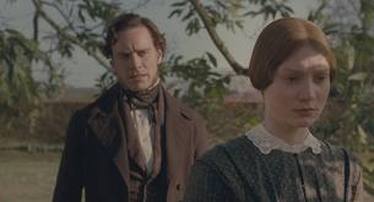 Jane and Rochester at the Tree Jane and Rochester at the Tree At a critical moment in the novel, Jane proclaims herself Rochester’s equal: “It is my spirit that addresses your spirit; just as if both of us had passed through the grave, and we stood at God’s feet, equal—as we are!” Rochester responds, “As we are!” Why is Jane so passionately outspoken? Is her self-valuation exceptional and true? Is she more noble and impressive here than Rochester is? Why is this long scene (Chapter 23) so important for the novel as a whole? Please respond to the questions above in your Primary Blog Entry. While you are composing this response, please consider the following questions in your blog entry. 1. React to the differences between Jane and the women who visit Rochester at Thornfield Hall. Comment on all aspects of these women’s lives. 2. What impact would marriage to Rochester have on the life of Miss Ingram? Jane? What could each of them bring to Rochester in a marriage? 3. How is marriage a political issue for these women? In your Primary Blog Entry, you should respond to the two questions above in a single entry. Your Secondary Blog Entry should respond to two of your colleagues' entries that are especially interesting to you. Part One Expectations (respond to the prompt above): 200-250 words, 2 quotes from the novel, minimal errors in grammar and usage, thoughtful and thorough writing. Please use the assigned "pen name" given to you in class PLEASE FINISH BY FRIDAY NIGHT! Part Two Expectations (read everyone's first responses, select two that interest you, and respond to their ideas): 100-150 words EACH, minimal errors in grammar and usage, thoughtful and thorough writing. Please use the assigned "pen name" given to you in class. FINISH BY SUNDAY NIGHT! 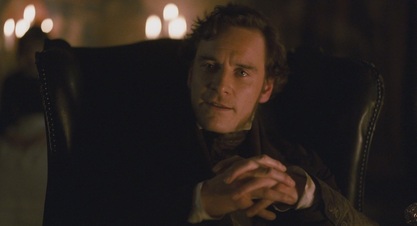 "All governesses have a tale of woe. What is yours?" "All governesses have a tale of woe. What is yours?" 1. What is it about Mr. Rochester that attracts Jane when she plainly states that she doesn't find him handsome when he asks her, “Do you find me handsome?” (pg. 149)? How does Jane’s view that “beauty is of little consequence” (pg 149) affect Mr. Rochester? What is it about their personalities that attract them to each other as well as the readers? 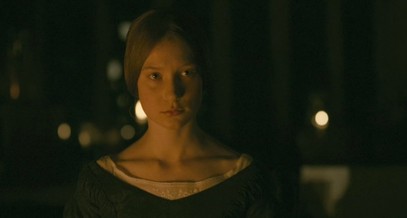 "I've never mistaken formality for insolence, sir. One I rather like. The other, nothing freeborn should ever submit to." "I've never mistaken formality for insolence, sir. One I rather like. The other, nothing freeborn should ever submit to." 2. How has their relationship between Jane and Mr. Rochester change when he told her that she “did not strike delight to my very inmost heart for nothing”? How will Jane do Mr.Rochester some “good in some way”? What is it that he’s hoping she will give him? In your Primary Blog Entry, you should respond to the two questions above in a single entry. Your Secondary Blog Entry should respond to two of your colleagues' entries that are especially interesting to you. Part One Expectations (respond to the prompt above): 200-250 words, 2 quotes from the novel, minimal errors in grammar and usage, thoughtful and thorough writing. Please use the assigned "pen name" given to you in class PLEASE FINISH BY FRIDAY NIGHT! Part Two Expectations (read everyone's first responses, select two that interest you, and respond to their ideas): 100-150 words EACH, minimal errors in grammar and usage, thoughtful and thorough writing. Please use the assigned "pen name" given to you in class. FINISH BY SUNDAY NIGHT! 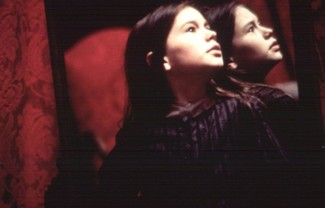 Jane in the Red Room Jane in the Red Room Now that you have been introduced to Jane, please respond to any or all of the questions below. You need to use textual evidence (quotes) from both Bronte's novel and from the chapters selected from Foster's book. After you have posted your Primary Blog Entry, please take some time to read ALL of your colleague's entries and then compose a thoughtful response (your Secondary Blog Entry) to TWO selected Primary Entries. 1. If you had to infer (guess) based on these chapters what type of woman society thought of as acceptable, what type of woman would that be?. 2. Reread the descriptions of fire in this segment. This is an important image that becomes more important as the novel progresses. What do you think it might mean? 3. What type of relationships does Jane have with her cousins? Her aunt? The servants at Gateshead? (not just the biological relationship, but also the emotional relationship). 4. What’s with the red room? What was your reaction to this section? Part One Expectations (respond to the prompt above): 200-250 words, 2 quotes from the short story, minimal errors in grammar and usage, thoughtful and thorough writing. Please use the assigned "pen name" given to you in class Part Two Expectations (read everyone's first responses, select two that interest you, and respond to their ideas): 100-150 words EACH, minimal errors in grammar and usage, thoughtful and thorough writing. Please use the assigned "pen name" given to you in class. 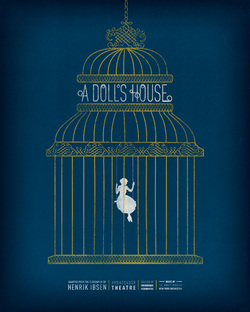 Below, you will find a selection of AP Literature Essay # 3 Prompts that listed "A Doll's House" among its suggested titles. Part One Expectations (please select one of the prompts and respond to the following): (1) Why does this prompt attract you in particular? (2) How does "A Doll's House" answer the question? (3) Write a single sentence thesis statement that you might use if you were writing to this essay prompt. 200-250 words, 2 quotes from the play, minimal errors in grammar and usage, thoughtful and thorough writing. Please use the assigned "pen name" given to you in class Part Two Expectations (read everyone's first responses, select two that interest you, and respond to their ideas): 100-150 words EACH, minimal errors in grammar and usage, thoughtful and thorough writing. Please use the assigned "pen name" given to you in class. AP Prompts: 1971. The significance of a title such as The Adventures of Huckleberry Finn is so easy to discover. However, in other works (for example, Measure for Measure) the full significance of the title becomes apparent to the reader only gradually. Choose two works and show how the significance of their respective titles is developed through the authors' use of devices such as contrast, repetition, allusion, and point of view 1983. From a novel or play of literary merit, select an important character who is a villain. Then, in a well-organized essay, analyze the nature of the character's villainy and show how it enhances meaning in the work. Do not merely summarize the plot. 1987. Some novels and plays seem to advocate changes in social or political attitudes or in traditions. Choose such a novel or play and note briefly the particular attitudes or traditions that the author apparently wishes to modify. Then analyze the techniques the author uses to influence the reader's or audience's views. Avoid plot summary. 1988. Choose a distinguished novel or play in which some of the most significant events are mental or psychological; for example, awakenings, discoveries, changes in consciousness. In a well-organized essay, describe how the author manages to give these internal events the sense of excitement, suspense, and climax usually associated with external action. Do not merely summarize the plot. 1995. Writers often highlight the values of a culture or a society by using characters who are alienated from that culture or society because of gender, race, class, or creed. Choose a novel or a play in which such a character plays a significant role and show how that character's alienation reveals the surrounding society's assumptions or moral values. 2005. In Kate Chopin's The Awakening (1899), protagonist Edna Pontellier is said to possess "That outward existence which conforms, the inward life that questions." In a novel or play that you have studied, identify a character who outwardly conforms while questioning inwardly. Then write an essay in which you analyze how this tension between outward conformity and inward questioning contributes to the meaning of the work. Avoid mere plot summary. Please listen to the audio recording of Ani DiFranco’s cover of the song, “Wishin’ and Hopin’.” Here is one excerpt of the lyrical content: Show him that you care, just for him Do the things that he likes to do. Wear your hair just for him,‘cause You won’t get him, thinkin’ and a prayin’ Wishin’ and hopin’. In your Primary Post, you should: (1) argue that such gender roles of dominance and submission still exist in today’s society; OR (2) argue that today our society no longer desires such gender specific behaviors, and that true love and marriage is based on mutual respect. Your Secondary Response Post can: (1) challenge your colleague's points, OR (2) make connections to your own lives, OR (3) support and defend a shared view, OR (4) somehow create a dialogue about the characters' actions and choices ***To add depth to your discussion, you may wish to discuss the irony of Ani DiFranco singing this song. Part One Expectations (respond to the prompt above): 200-250 words, quotes from Act 2 AND "Wishin' and Hopin,'" minimal errors in grammar and usage, thoughtful and thorough writing. Please use the assigned "pen name" given to you in class Part Two Expectations (read everyone's first responses, select two that interest you, and respond to their ideas): 100-150 words EACH, minimal errors in grammar and usage, thoughtful and thorough writing. Please use the assigned "pen name" given to you in class. 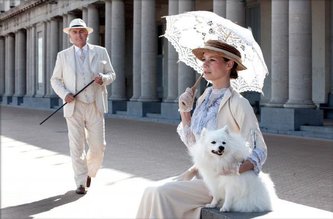 "The Lady With the Little Dog" "The Lady With the Little Dog" "You abuse me for objectivity, calling it indifference to good and evil, lack of ideals and ideas, and so on. You would have me, when I describe horse-thieves, say: "Stealing horses is an evil." But that has been known for ages without my saying so. Let the jury judge them; it's my job simply to show what sort of people they are. I write: You are dealing with horse-thieves, so let me tell you that they are not beggars but well-fed people, that they are people of a special cult, and that horse-stealing is not simply theft but a passion. Of course it would be pleasant to combine art with a sermon, but for me personally it is extremely difficult and almost impossible, owing to the condition of the technique. You see, to depict horse-thieves in seven hundred lines I must all the time speak and think in their tone and feel in their spirit, otherwise, if I introduce subjectivity, the image becomes blurred and the story will not be as compact as all short stories ought to be. When I write, I reckon entirely upon the reader to add for himself the subjective elements that are lacking in the story." From a letter to Alekseys S. Suvorin in Letters on the Short Story, the Drama, and Other Literary Topics by Anton Chekhov After reading the excerpt above, please respond to the following prompt: Why does Chekhov reject sermonizing in his fiction? How does his "objectivity" affect your reading of "The Lady with the Little Dog"? Part One Expectations (respond to the prompt above): 200-250 words, 2 quotes from the short story, minimal errors in grammar and usage, thoughtful and thorough writing. Please use the assigned "pen name" given to you in class Part Two Expectations (read everyone's first responses, select two that interest you, and respond to their ideas): 100-150 words EACH, minimal errors in grammar and usage, thoughtful and thorough writing. Please use the assigned "pen name" given to you in class.  Henrik Ibsen "A Doll's House" Click on the image above to see a copy of the play. Henrik Ibsen "A Doll's House" Click on the image above to see a copy of the play. In Ibsen's play, A Doll's House, the main character, Nora, is forced to look at her life--her roles as a person, a mother, a wife, a worker. Even though the play was published in the late 1870s, the ideas Ibsen explores are still quite appropriate for people today. Your assignment is to answer the question, "What is a woman's role in society?" In what area(s) do a woman's most important responsibilities lie? The topic is intentionally vague to give you the freedom to make what you wish of the assignment. You could take an historical viewpoint, a personal viewpoint, or an omniscient (objective) viewpoint. |
Blog Post Rubric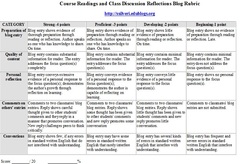
Archives
February 2023
Categories
All
|
 RSS Feed
RSS Feed